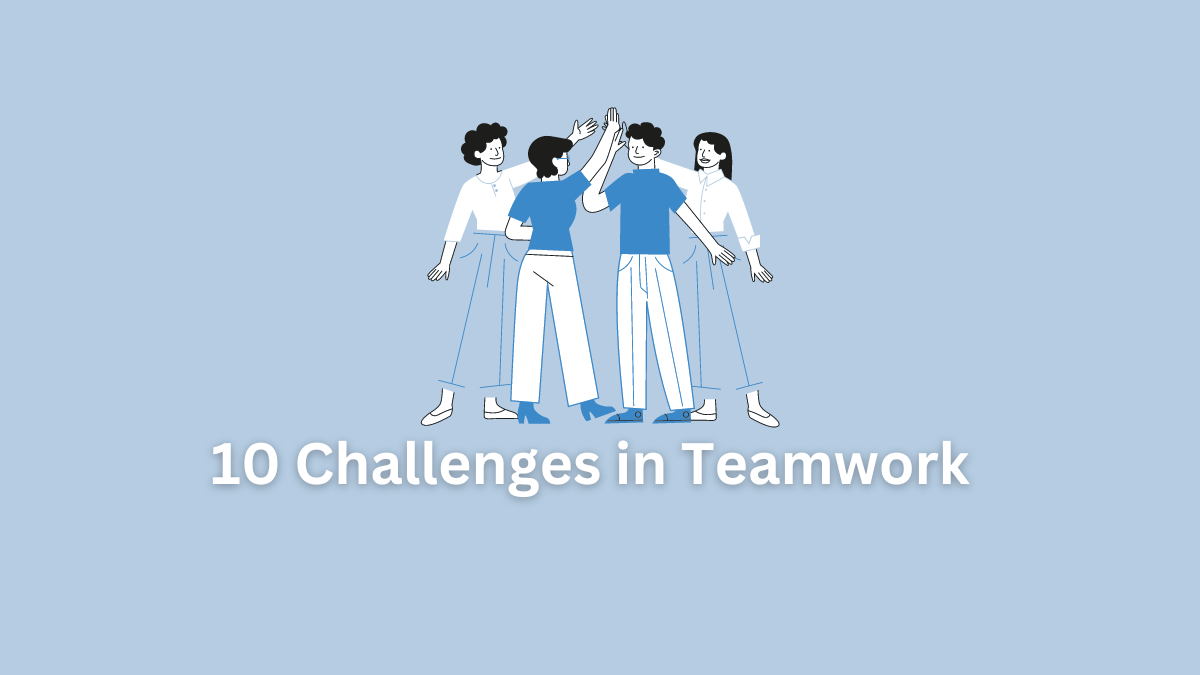Challenges in TeamWork
Teamwork is a fundamental aspect of organizational success, yet it comes with various challenges that can hinder productivity, collaboration, and overall team effectiveness. Understanding these challenges and implementing strategies to overcome them is essential for fostering a cohesive and high-performing team environment.
In this article, we will explore 10 common challenges in teamwork and strategies to overcome them:
Building Trust
Challenge: Trust is crucial for effective teamwork, but it can be challenging to establish, especially in diverse or newly formed teams.
Strategy: Foster open communication, transparency, and consistency. Encourage team members to share information, acknowledge mistakes, and honor commitments. Lead by example and demonstrate trustworthiness in your actions and decisions.
Communication Breakdowns
Challenge: Poor communication can lead to misunderstandings, conflicts, and decreased productivity within teams.
Strategy: Establish clear communication protocols, including regular team meetings, defined channels for information exchange, and active listening practices. Encourage open dialogue, ask clarifying questions, and provide constructive feedback to ensure everyone is on the same page.
Physical Proximity
Challenge: In today’s globalized workforce, teams may be geographically dispersed, making face-to-face interactions challenging
Strategy: Leverage technology to facilitate virtual communication and collaboration, such as video conferencing, instant messaging, and project management tools. Organize periodic in-person meetings or team-building activities to strengthen relationships and foster a sense of connection among team members.
Team Member Self-Awareness
Challenge: Low self-awareness among team members can hinder effective communication, collaboration, and conflict resolution.
Strategy: Encourage self-reflection and self-assessment among team members through personality assessments, feedback sessions, and professional development opportunities. Provide constructive feedback and coaching to help individuals recognize their strengths, weaknesses, and blind spots.
Read More: 10 Challenges in Centralization of Authority
Lack of Purpose
Challenge: Without a clear understanding of the team’s purpose and goals, team members may lack motivation and direction.
Strategy: Communicate the team’s mission, objectives, and expectations. Help team members understand how their contributions align with the team’s overarching goals. Reinforce the importance of the team’s work and its impact on the organization’s success.
Conflict Resolution
Challenge: Conflicts are inevitable in teamwork, but unresolved conflicts can disrupt productivity and damage team morale.
Strategy: Establish a structured approach to conflict resolution, including open communication, active listening, and mediation techniques. Encourage empathy and perspective-taking to facilitate understanding and compromise. Provide training on conflict management skills and encourage a culture of constructive feedback and resolution.
Read More: 10 Challenges in Staffing
Personality Conflicts
Challenge: Differences in personalities, work styles, and communication preferences can lead to interpersonal conflicts and team tension.
Strategy: Foster a culture of respect, acceptance, and appreciation for diversity. Encourage team members to recognize and value each other’s strengths and perspectives. Facilitate team-building activities and exercises to improve interpersonal relationships and promote collaboration.
Withholding Information
Challenge: Some team members may withhold information out of fear, competition, or a lack of trust, leading to gaps in communication and collaboration.
Strategy: Create a culture of transparency and information-sharing by emphasizing the importance of open communication and knowledge exchange. Lead by example by sharing relevant information proactively and encouraging others to do the same. Establish clear guidelines for information sharing and promptly address any concerns or barriers to transparency.
Read More: 10 Challenges in Leadership
Reduced Engagement
Challenge: Disengaged team members may lack motivation, enthusiasm, and commitment, impacting overall team performance and morale.
Strategy: Identify factors contributing to low engagement, such as unclear expectations, lack of recognition, or burnout. Foster a positive work environment by recognizing and celebrating achievements, providing professional growth and development opportunities, and promoting work-life balance. Encourage open dialogue and solicit feedback from team members to address any concerns and improve engagement levels.
Skill Overlap
Challenge: When team members possess similar skills or expertise, it can lead to redundancy, inefficiency, and conflicts over roles and responsibilities.
Strategy: Conduct a skills assessment to identify gaps and redundancies within the team. Foster a culture of continuous learning and skill development by providing opportunities for cross-training, mentorship, and professional development. Encourage collaboration and knowledge sharing to leverage each team member’s unique strengths and expertise effectively.
Hence, these are the 10 challenges in team work and strategies to overcome them.
Read Next: 10 Challenges in Autocratic Leadership
